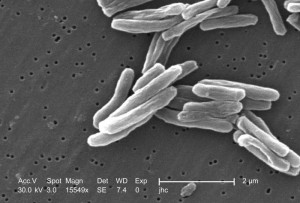MONDAY, 24 MAY 2010
A defining feature of the pathogenicity of Mtb, is metabolic adaptation to the host. In vitro, Mtb is able to grow on a variety of carbon sources, but mounting evidence implicates fatty acids as the major source of carbon and energy for Mtb during infection.The researchers applied genetic analysis and carbon tracing to look at what role PEPCK may play. PEPCK is an important enzyme for Gluconeogenesis, the production of sugars from fatty acids, in Mtb growth and survival. They silenced the gene that codes for PEPCK in one Mtb strain and compared the growth of PEPCK-deficient bacteria with that of bacteria from an unmodified Mtb. They found that PEPCK is required for growth of Mtb both in vitro and in vivo. Importantly, Mtb which lacks PEPCK not only failed to replicate in mouse lungs but also failed to survive. Their results show that Mtb relies on Gluconeogenesis throughout the infection.
The experiments suggest that Mtb, the pathogenic bacterium responsible for most human tuberculosis cases, may use fatty acids for growth in vivo and points to PEPCK as potential target for anti-TB chemotherapy.
Written by Nitika Somani

